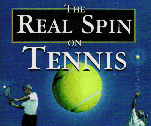
This excerpt is from the early chapters of the book where Broudy writes about something he feels is rarely taught in tennis clinics or schools: the proper pre-practice and match warm-up. He titles this section, "Tune-Up Before You Play"
The book (250 pages) is recently released by JWB Tennis
Publications, Leucadia, CA and is priced at $14.00 in paperback. The book
can be found at several popular book stores, including Barnes and Noble.
To order the book call 1-619-753-4119. ISBN#: 0-9654872-0-2
Tune-Up Before You Play
How do you get ready for work or school? Do you throw some clothes on as soon as you get out of bed and rush right out the door? Would you feel comfortable or confident if you went about your day without brushing your teeth, showering, or shaving? It's not likely. Many of you probably have a routine that you follow religiously-one that (whether you realize it or not) actually sets the tone for the rest of the morning, afternoon, and evening. If you feel inspired and enthusi-stic during your early-morning activities, that feeling will most likely continue; if you feel lethargic and pessimistic, however, things might not go so well. Proper preparation is key-which only makes sense. After all, most professional athletes, artists of all kinds, and even topnotch businesspeople have rituals that they perform on a daily basis to get them in tune for the upcoming day.
Similarly, if you--a tennis player-want to get the most out of your practice session, lesson, or match, then prepare like the pros, and get in the habit of doing so every time you step on the court. Rarely do I see that any of the tennis programs, lessons, or clinics mandate a pre-court warm-up, and that's a disservice to you! Pre-game routines vary to some degree from player to player, but the basics need to address the three areas that make up a real player: one's physical body, mental focus, and emotional stability. (I'll go into more detail later in the chapter.)
True "all-court players" learn something every time they play, whether it's during a lesson, a practice session, or a match. And let me tell you: learning is a skill that can definitely be developed. The first thing you must do is create an atmosphere that is conducive to learning, one that is separate from the competitive aspects of tennis. You can't learn if you're always competing with yourself and others. It's vital when you're being taught new information that it gets properly assimilated in your mental body, and not just your emotional one. The difference is that the mental body equates to learning, while the emotional body just satisfies the ego.
A match, practice session, or lesson must be preceded by exercises that help your body get warm and limber, and which put your "self' into a "walking sleep"--that is--you become so centered within yourself that you are oblivious to any and all outside distractions or pressures. That's how it feels when a "player" plays the game, and that's why when a pro is playing well, a fellow pro commentating a match will say, "He's unconscious." This walking sleep is crucial to your learning process because it's the condition that brings you closest to "playing in the zone"--playing with your <% ns_puts [nsv_get mkm_includes mkm_oldContentFooter_inc] %>